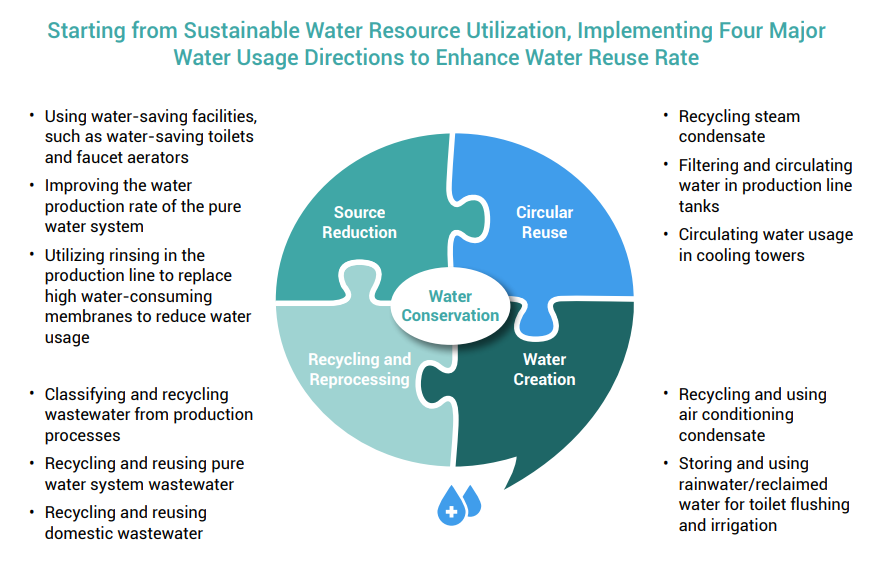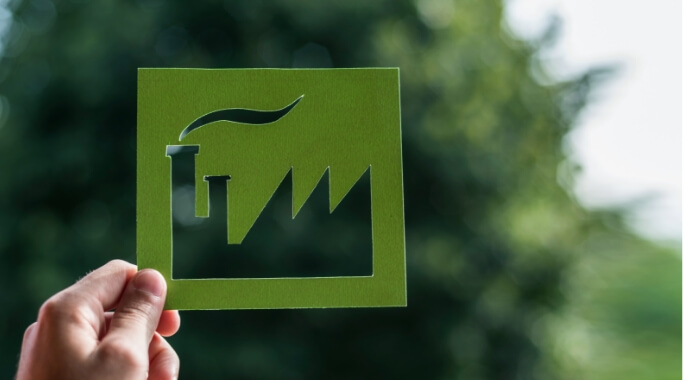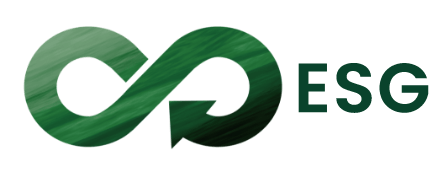Water Resource Management
Starting from the sustainable use of water resources, BenQ Materials follows three main principles: water inventory, water-saving measures, and recycling and reuse. These principles extend to four strategic stages: wastewater reduction, wastewater recycling, development of new water sources, and zero wastewater discharge. Wastewater reduction and recycling are approached from four main water usage areas: domestic, process, air conditioning systems, and boiler water. The company aims to gradually improve water use efficiency and strategies. In 2023, the Taoyuan Plant introduced the ISO 46001 Water Efficiency Management System and passed the verification.

In 2024, BenQ Materials (excluding subsidiaries) recorded a total water withdrawal of 357.25 million liters (ML) across all facilities, representing an increase of 14.80 ML compared to 2023. The total wastewater discharge amounted to 276.48 ML, which was directed to industrial park wastewater treatment plants—an increase of 7.24 ML compared to 2023. The water consumption was 80.77 ML, mainly due to evaporation losses from cooling towers in the chilled water system.
In 2024, the discharge rate (wastewater discharge / total water withdrawal) for BenQ Materials was 76.03%. Considering internal water reuse, including process water recovery, scrubber water recovery, reclaimed process water treatment, ROR circulation reuse, wastewater treatment reuse, and HVAC water reuse, the R2 (reuse rate) reached 86.73%. Including water reused from cooling towers, the R1 (total plant reuse rate) reached 97.39%.
Annual water resource utilization intensity and utilization overview

- Note 1: BenQ Materials uses the WRI Aqueduct water risk assessment tool to analyze the geographical locations of its operating sites. In the
short term, only the Suzhou facility in mainland China is identified as a high water stress risk area, accounting for approximately 11.93% of total
water withdrawal.
Note 2: The scope of 2024 water resource disclosures includes the following operational sites: BenQ Materials Headquarters, Taoyuan Plant,
Longtan Plant, Yungke Plant, Suzhou Plant, Wuhu Plant, Lianhe Medical Materials, Hailu Plant, BMC (Plant 28), BMM, and DTB.
- Note 3: Water resource data for the years 2021–2024 have been updated. The disclosed figures do not include subsidiaries (Web-Pro, Cenefom,
and GENE.JET Biotech). Third-party verification is expected to be completed in 2025, after which these subsidiaries will be included in the disclosure scope.
Water resource efficiency training provided to employees
| Course Title |
Training Hours |
Training Date |
Number of Participants |
| Air Conditioning & Hot Water Operation Instructions |
8 |
2024/2/22 |
8 |
| Review of Abnormal Events Improvement in Water System |
8 |
2024/3/21 |
8 |
| Handling of Pure Water Tank Level Abnormalities |
6 |
2024/5/22 |
6 |
| M4 Water-Cutting Ice Machine Cooling System Explanation |
6 |
2024/6/25 |
6 |
| Wastewater Treatment Responsible Personnel In-service Training – Net Zero Emission Course |
7 |
2024/4/18 |
1 |
| 2024 Industrial Water-saving Guidance and Module Testing Results Discussion |
2 |
2024/11/14 |
1 |












